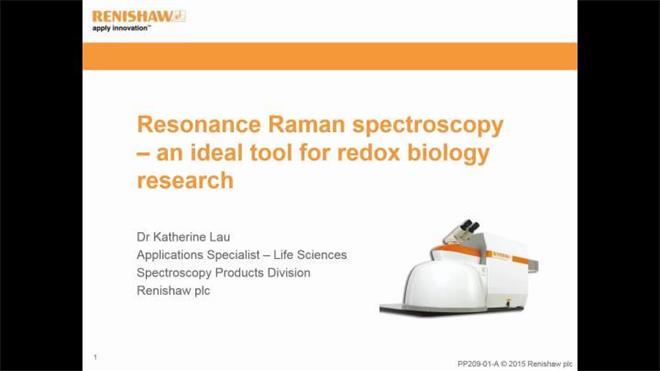Al momento, questa pagina non è disponibile nella lingua scelta. È possibile visualizzare una traduzione automatica realizzata con Google Translate. Renishaw declina qualsiasi responsabilità relativa alla fornitura di tale servizio e specifica di non avere controllato la traduzione.
È possibile contattarci per richiedere ulteriore assistenza.
Webinar – Resonance Raman spectroscopy for redox biology research
Part 1: Resonance Raman spectroscopy – an ideal tool for redox biology research by Dr Katherine Lau
Part 2: Raman microscopy and myoglobin priming stem cells by Dr James Armstrong
Resonance Raman (RR) spectroscopy is the ideal tool for redox biology research. Not only does it demonstrate high sensitivity to haem proteins, it can also elucidate their oxidation and oxygenation states in situ (solution, organelles, cells and tissues). RR imaging provides both chemical and spatial information, enabling correlations between haem protein distribution, oxidation state, and protein/cell function to be made. In this webinar, you'll learn about RR and the benefits of using RR imaging for redox biology research. You'll also find out about how RR imaging was used to provide useful insight into how the functionalization of human mesenchymal stem cells with myoglobin improved the biochemistry and matrix distribution of grown cartilage. (Armstrong et al, 2015, Nature Communications, 6: 7405)
Watch the webinar
About Katherine:
Dr Katherine Lau undertook her doctoral training at the Institute of Analytical Sciences in Dortmund and at Friedrich-Schiller University in Jena, Germany. Her research was on vibrational spectroscopy on stem cells in wound healing. On completing her doctorate, Katherine joined Renishaw plc as a life sciences applications scientist. During her time at Renishaw, she applied Raman spectroscopy to a variety of biological and biomedical research topics, including cancer diagnostics, intracellular nanoparticles and regenerative medicine.
About James:
Dr James Armstrong graduated from the University of Warwick with a first class Masters in Chemistry. From there, he undertook a four year PhD at the Bristol Centre for Functional Nanomaterials, where he eventually specialised in protein bioconjugation and cartilage engineering under the supervision of Dr Adam Perriman, Prof. Anthony Hollander and Prof. Stephen Mann. James is currently the Arthritis Research UK fellow at Imperial College London.
We're here when you need us
To find out more about this application area, or an application that isn't covered here, contact our applications team.
Contact our applications team

